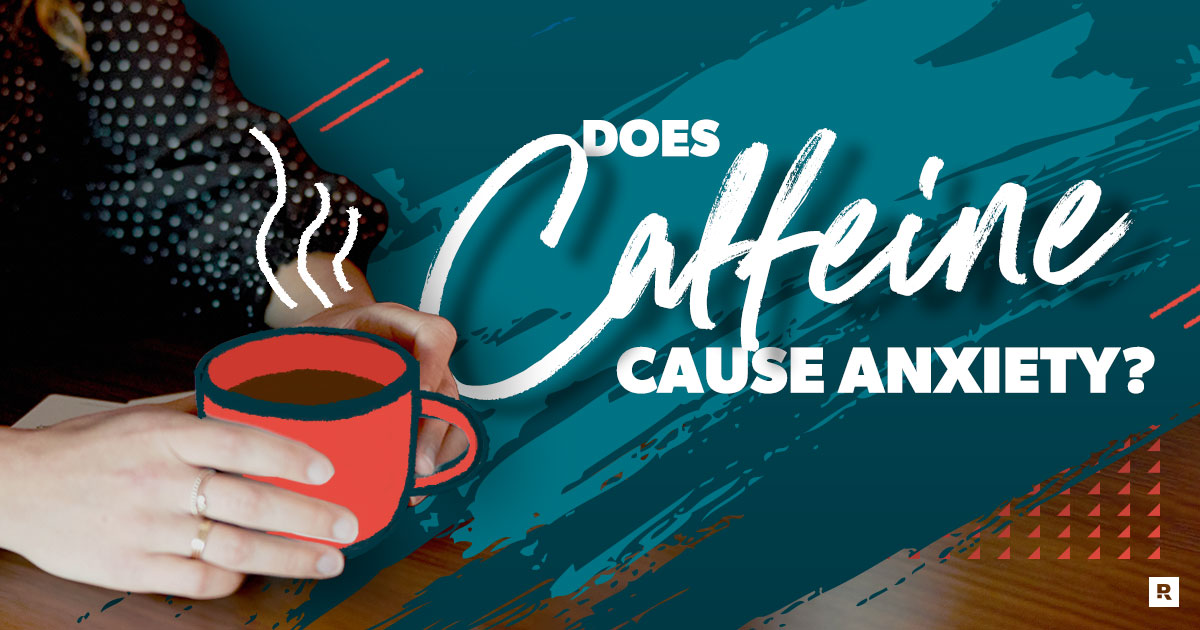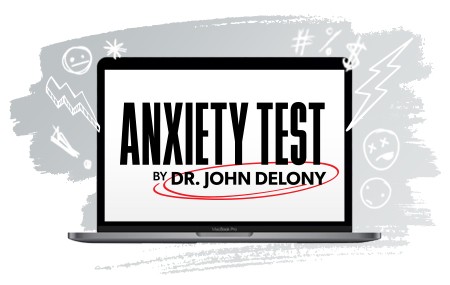
The world is an anxious place full of anxious people. I’m one of them, and chances are, you are too. Many of us experience anxiety as we pack our lives and schedules full of taking care of kids, crushing it at work, squeezing in a workout, trying (and possibly failing) to connect with our spouses, and maintaining a social life on the weekends. But when your energy falls short as you dash from meetings to appointments to soccer practices to dinners with your spouse and then wake up a few hours later to start the cycle over again, it’s easy to rely on one of the most used psychoactive stimulants in the world to keep you powering through: caffeine.
Given how chaotic and overscheduled our lives are, it’s no surprise 9 out of 10 adults drink caffeine.1 But if you look around, you’ll see that everyone is both inhaling copious amounts of caffeine and struggling with anxiety. So it's important to ask: Does caffeine cause anxiety? Let’s find out.
What Is Caffeine?
Caffeine is a natural chemical stimulant found in coffee, tea, soda, energy drinks and chocolate. In large doses, caffeine molecules stimulate (or activate) your brain and nervous system and help circulate stress chemicals, like adrenaline and cortisol, throughout your body. Believe it or not, caffeine doesn’t actually give you energy, but it blocks the chemicals that build up in your body to let you know you need rest. Caffeine also mimics a stress response in your body. So when your heart starts beating faster and your body is flooded with stress-response chemicals (like adrenaline and cortisol), your thoughts and mind sharpen to keep up. This is why you might feel like it’s impossible to wake up until you drink a cup of coffee . . . or three. And it’s why you might feel sharp, alert and ready to take on challenges after downing an energy drink.
Caffeine and Anxiety
Studies have shown numerous benefits of drinking caffeine, including increased focus and alertness, improved athletic performance, and even an uplift in mood.2,3 But too much of a good thing can come with its fair share of problems—especially if your body is already sensitive to stimulating foods and drinks. But does caffeine cause anxiety? The short answer is no, caffeine doesn’t technically cause anxiety. But because it’s a stimulant, caffeine can make anxiety and panic symptoms (like a racing heart, racing thoughts or insomnia) worse in people already diagnosed with anxiety or panic disorders.4 And because our minds are always trying to make sense of our bodies and our environment, our minds will spin up stories about why our bodies are racing, stressed and pulsing. Too much caffeine can feel like anxiety, which can inadvertently signal your body to find something to be anxious about.
Free Anxiety Test
This test will help you get clarity on the situations that could be contributing to your feelings of stress, anxiety and burnout.
What Are the Effects of Too Much Caffeine?
On average, about 400 milligrams of caffeine per day is considered safe for an adult.5 That’s about as much caffeine as you’d get in four cups of coffee or 10 cans of cola. But remember, this is an average—it’s not necessarily the right amount for every person. For example, I’ve found I enjoy the effects of 500 mg of caffeine, while my wife cuts her single cup of coffee in the morning with decaf. Individually, a person’s sensitivity to caffeine will depend on factors like weight, body type, how much they’ve eaten that day, and how often they drink caffeine, just to name a few. But too much caffeine for you can show up as:6
- Insomnia
- Shakes and jitters
- Racing heart
- Stomachaches
- Headaches
- Lack of appetite
- Caffeine cravings
- Trouble concentrating
- Acid reflux
- Muscle twitches
- Dehydration
These symptoms feel like anxiety, right? It may be that you already experience these symptoms because of other factors in your life, like a stressful job, unsafe relationships or not enough sleep—and the caffeine is amplifying (rather than causing) the anxiety alarms and signals your body is already sending you.
Average Amounts of Caffeine in Beverages
If you’re curious about how much caffeine you typically consume, take a look at the nutrition facts on your drink labels. But if you’re simply curious about common drinks and how much caffeine they contain, here’s a list. To give you a point of reference, these 10 common beverages and their caffeine content are based on a single serving.7
- Bubly sparkling water: 0 mg in 12 oz.
- Coffee (decaf): 2 mg in 8 oz.
- AriZona iced tea: 30 mg in 16 oz.
- Coca-Cola: 34 mg in 12 oz.
- Bigelow black tea: 45 mg in 8 oz.
- Red Bull: 80 mg in 8.5 oz.
- Chick-fil-A brewed coffee: 136 mg in 10 oz.
- Coffee (regular): 163 mg in 8 oz.
- Dunkin’ latte: 166 mg in 14 oz.
- Bang Energy: 300 mg in 16 oz.
How to Cut Back on Caffeine
If you drink coffee out of a firehose and otherwise bathe in caffeine like me, quitting cold turkey won’t be fun. In fact, it’s brutal. Cutting caffeine in one fell swoop can cause wicked withdrawal symptoms, including headaches, mood swings and fatigue. Quitting caffeine isn’t dangerous, but it can come with temporary side effects. If you’ve been mainlining caffeine, I recommend talking with your doctor to determine the best approach to quit or, at minimum, slow down your intake. Here are eight ways to start cutting back on your caffeine intake.
- Make (or order) your coffee half caf, half decaf, and slowly work your way to full decaf.
- Stop drinking caffeine altogether after 10 or 11 a.m.
- Replace your morning coffee with herbal tea as an alternative. (I know, I know . . . Why go on, right?)
- Explore natural coffee substitutes, like matcha, chicory coffee, lemon water, golden milk (a mix of milk, turmeric, honey and cinnamon), or mushroom blends (like MUD\WTR and Four Sigmatic).
- Drink more water. Your body will thank you.
- Eat foods that support your energy levels, like good protein, fruits, vegetables, nuts, seeds and eggs.
- Try cold showers and cold plunges.
- Exercise. I’ve personally found a hard bout of exercise can get my blood flowing and create a highly energetic state, free from chemicals.
How to Start Healing Anxiety
Folks, anxiety is a real thing affecting millions and millions of Americans. When someone tells me they feel anxious, one of my first questions is often about their caffeine intake. But caffeine is rarely the only answer. (Check out my free anxiety test to learn what else may be contributing to feelings of stress and anxiety.) If you’re struggling with feelings of stress and anxiety, know that this isn’t the end of the road. You can learn practical steps and long-term strategies to better respond to whatever life throws at you in my new book, Building a Non-Anxious Life. You can start reading for free today. I hope you’ll check it out.




